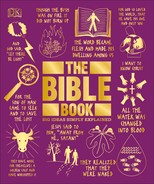
IN BRIEF
Acts 2:1–47
The day of Pentecost
c.29 CE Jerusalem. The city is full of Jewish pilgrims, who converge there annually for the feast of Pentecost (Shavu’ot), seven weeks after Passover.
Peter Despite his denial of Jesus following Christ’s arrest, Peter is again leader among the core disciples.
Other disciples According to Acts, the male disciples number about 120. Alongside them are Jesus’s mother Mary and the other female disciples.
Just as thunder, lightning, and dense cloud accompany the giving of the Torah in Exodus, so dramatic phenomena accompany the giving of God’s Spirit at the beginning of Acts. This happens during the feast of Pentecost, or Shavu’ot—one of three great pilgrimage festivals that each year brought throngs of Jews from across the known world to Jerusalem. Also in Jerusalem, according to Acts, is the core group of Jesus’s disciples, who have met to pray, as they have done regularly since His ascension, ten days previously. Suddenly, a noise like that of a strong wind fills the house where the disciples are meeting and tongues of fire come to rest on their heads. Impelled by a strange inner power, the disciples find themselves speaking in languages they do not know.

A great confusion
The disciples make so much noise that a crowd gathers, including many of the pilgrims who have come to Jerusalem from other parts of the world. These foreigners are astonished, because the disciples, who by now appear to have spilled out onto the street, are miraculously speaking to them in their native languages, telling them about the “wonders of God.”
In response to these strange happenings, some of the onlookers are skeptical and dismissive, accusing the disciples of being drunk. At this point, Peter, the leader of the disciples, stands up and addresses the crowd. The strange phenomena they are witnessing, he announces, are not the result of drunkenness, but they are the work of God—as foretold by the Prophet Joel in the Hebrew scriptures. He reminds his listeners of Jesus, who was God’s prophet and Messiah and whom the people of Jerusalem have recently killed. This same Jesus, God has now raised from the dead.
Peter’s speech has an electrifying effect on the crowd, many of whom are “cut to the heart” and beg to know what they can do in an attempt to make things right. Peter exhorts them to repent and become baptized. According to the Book of Acts, some 3,000 pilgrims follow his command, creating a massive increase in the number of believers.
The Pentecost event
Acts presents Peter’s speech as a work of the Holy Spirit. At His ascension, Jesus promises that the Spirit would empower His disciples to be witnesses to His resurrection, beginning in Jerusalem (Acts 1:8). At Pentecost, God gives His Spirit—dramatically and emphatically—to the disciples. Just as the Spirit enabled the disciples to speak in other languages, so He inspires Peter’s speech to the people of Jerusalem. Some scholars, however, think that Luke—the author of Acts—employed a literary device, common among ancient Greek historians, in which speeches are put into the mouths of leading figures in order to comment upon the events they describe.
Peter’s speech begins with the words of the Prophet Joel, who said the Spirit would be poured out on God’s people at a critical point in history: “Even on my servants, both men and women, I will pour out my Spirit in those days, and they will prophecy. … And everyone who calls on the name of the Lord will be saved” (Joel 2:18–32). Peter goes on to argue that God had empowered Jesus’s life and ministry, leading to His crucifixion. He quotes David’s words that God would not abandon His holy one to death (Psalm 16:8–11), noting that while David’s body was still in its tomb, God had raised Jesus and poured out His Spirit as promised. Jesus had then risen into heaven in fulfillment of God’s command that the Messiah sit at His right hand until God defeated all the Messiah’s enemies (Psalm 110:1). Luke reports that 3,000 of the assembled people of Jerusalem, convinced by Peter’s words, repent their sins and receive forgiveness and the Holy Spirit.
““All of them were filled with the Holy Spirit and began to speak in other tongues as the Spirit enabled them.”
Acts 2:4
The early Christian community

Luke’s account of the events of Pentecost concludes with a brief description of the community that emerged in Jerusalem as a result of that day’s conversions. This is marked, says Acts, by four elements: teaching by the Apostles; fellowship; the breaking of bread; and prayer. The fellowship is radical: the believers are said to have owned everything in common, selling their possessions and distributing the money that they raised according to people’s needs—all in a spirit of gladness and generosity.
All four elements were no doubt present in the early Christian community of Jerusalem, but later in Acts, Luke reveals tensions among them as well. Attempting to win unwarranted regard, some lie about their generosity and are judged by the Holy Spirit (Acts 5:3–5). For Christians since, it has remained an inspiration and a challenge.
See also: The Calling of the Disciples • The Crucifixion • The Empty Tomb • The Great Commission
